
- Details
- By The Barman
- Hits: 7487
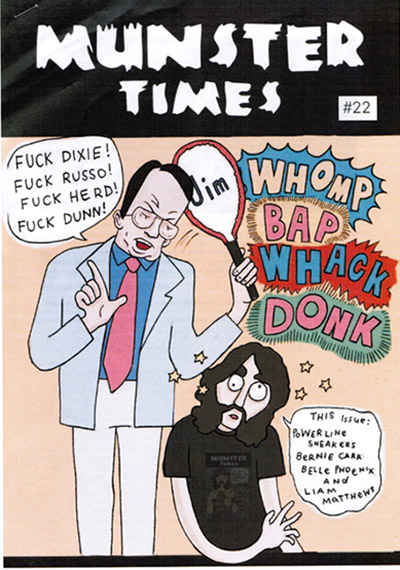 Everybody of a certain vintage who follows non-mainstream rock and roll has a soft spot for ‘zines. One of the reasons you’re reading this electronic magazine is down to two, 48 Crash and Vicious Kitten.
Everybody of a certain vintage who follows non-mainstream rock and roll has a soft spot for ‘zines. One of the reasons you’re reading this electronic magazine is down to two, 48 Crash and Vicious Kitten.
48 Crash was the archetypal Sydney zine of the early ‘80s. Hand-written (and coloured, sometimes), its photocopied pages spoke of Le Hoodoo Gurus, the Visitors, the three-piece Screaming Tribesmen and the Lipstick Killers - bands that struggled to attract mainstream attention elsewhere. It championed the so-called Detroit Sound that fuelled the Sydney music scene for more than a decade.
Ten years later, Vicious Kitten was an offshoot of the record label of the same name and professional publication that aimed its lens at people like Johnny Thunders, Kevin K, Jeff Dahl and Freddy Lynxx. Very Lower East Side, in spirit.
An honourable mention also to Sydney's B Side, that covered the left-of-centre, extreme local musical scene. Unbelievably Bad fills the same niche today. There were the rock local papers (RAM, the bible, and Juke) that were consumed religiously, but zines had all the cool stuff and never mentioned Chisel, Icehouse or Farnham.
- Details
- By Robert Brokenmouth
- Hits: 7763
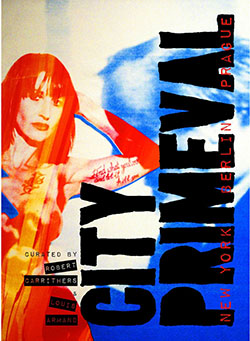 You may, or may not, see this book in shops. If you do, buy it. Most of the readers here will want to read the New York section. So don’t hesitate.
You may, or may not, see this book in shops. If you do, buy it. Most of the readers here will want to read the New York section. So don’t hesitate.
But I’m s’posed to be a critic or something and The Barman wants to know: how many McGarretts? In spite of the several things which annoy the hell out of me, "City Primeval" rates a mighty Three McGarretts. Yep: 100 percent..
Why so high, Grand-dad?
Well, the concept alone is mighty. And it could’ve been seriously terrible. But "City Primeval" is one of those unique, slanted historiography things which are invaluable to any music/ culture enthusiast. Sure, the book could’ve done with a decent editor, and sure some of the people writing here don’t usually write so it’s not the smoothest.
But that’s not the point, at all, and in fact is part of the charm. Reading "City Primeval" doesn’t just give us a bit more context, but part of the "ah-HA!" understanding which so many outsiders to any florid scene lack.
- Details
- By Robert Brokenmouth
- Hits: 7223
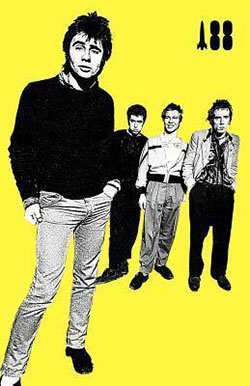 Get this book. If you don’t have it, get this book now. If you do have it - but not this edition - get this book now.
Get this book. If you don’t have it, get this book now. If you do have it - but not this edition - get this book now.
If you do have a copy of this edition, get copies of "I Was a Teenage Sex Pistol" and give them to your friends, relations, people you know hate punk rock, everyone you know who reads biographies, and especially, your other half.
Why? Apart from coming across like he’s speaking the truth plainly without over-egging the thing, it’s occasionally so funny it makes your cocoa go down the wrong way and come out of your nose.
Or perhaps that’s just me; try this: After the Grundy Incident, "I didn’t speak to my mum for about a week. When I finally did talk to her, all she could say was, 'Glen, it’s terrible what you’ve done, you used to be such a nice boy, no every time I go to work … they call me Mrs Sex Pistol.'”
I had to change my top and leave it in the sink overnight to soak out the cocoa stain.
- Details
- By The Barman
- Hits: 9845
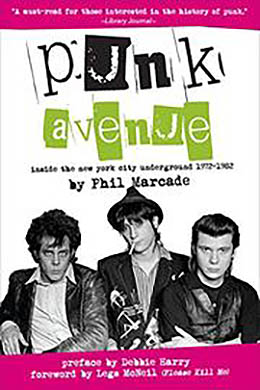 Phillippe Marcade was briefly drummer and then frontman for long-running New York City band The Senders, and a close confidant of many on the CBGB and Max’s Kansas City scenes.
Phillippe Marcade was briefly drummer and then frontman for long-running New York City band The Senders, and a close confidant of many on the CBGB and Max’s Kansas City scenes.
Born in France, for the most illegally living in NYC, he rode the rock and roll roller coaster as hard as anyone in Lower Manhattan.
“Punk Avenue” - the title is a play-on-words reference to the Park Avenue location of Max’s - is a fantastic read. There are no dead spots; Marcade tells his story colourfully, underlined by droll, self-deprecating humour.
- Details
- By The Barman
- Hits: 9904
 It’s been said that everybody does have a book in them, but in most cases that's where it should stay. Melbourne musician Kim Volkman begs to differ.
It’s been said that everybody does have a book in them, but in most cases that's where it should stay. Melbourne musician Kim Volkman begs to differ.
Now, he’s not exactly a household name so you could well ask what business Volkman has writing an autobiography. If you do I’ll not-so-respectfully point out that Justin Bieber has five (allegedly) self-penned books against his name on Amazon right now.
It helps that Volkman has led an interesting musical life. Guitarist with Ian Rilen and the Love Addicts - one of the most underrated, raw and real bands to appear on Australian stages in the last 30 years - he’s also had three stints filling his late ex-band leader’s bass spot in X.
Volkman’s played with many lesser-known bands - including his own very good Whiskey Priests. Unlike Justin Bieber, he’s never had notable success. That’s probably a good thing in Kim’s case - on his own admission, it might have killed him.
- Details
- By Robert Brokenmouth
- Hits: 7474
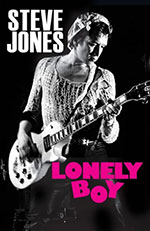 Here are two books from people whose names you may know that are essential purchases.
Here are two books from people whose names you may know that are essential purchases.
This is from “Lonely Boy”:
… all bands are basically the fucking same. The reason I still - to this day - love watching documentaries about bands like the Eagles … is that I can totally relate to them. The personalities involved and the reasons for the tensions between them never seem to change.
The singer - because the job requires the kind of person who wants to be in the front going ‘look at me, look at me’ - will almost always be very insecure, and usually a bit of a cunt. Then there’s the guitarist, who wants to get all the pussy, and there’s always at least one weird introvert…
Lead Guitarist Syndrome and Lead Singer Syndrome are terms you don’t see in the Macquarie, or the OED. But they exist, in fact if not in print.
- Details
- By The Barman
- Hits: 7150
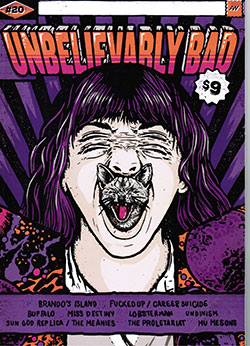 One of the last Aussie ‘zines standing is setting some sort of record for durability, but issue 20 is tinged with deep sadness.
One of the last Aussie ‘zines standing is setting some sort of record for durability, but issue 20 is tinged with deep sadness.
Editor Danger Coolidge’s opening column, detailing the life and tragic loss of his son, Angus Reekie, who took his own life late last year at the age of 16, is one of the most powerful things you’ll read. Cathartic in the extreme, if it doesn’t touch you, you’re not human.
On the brighter side of the coin, this issue is the usual mix of gems, surprises and obscurities. The interview with Buffalo vocalist Dave Tice is detailed and comprehensive (and we played a small part in making it happen so it’s all the more satisfying.) The chat with Link Meanie is long overdue and covers a storied and ongoing career that's taken on fresh legs wityh Sun God Replica.
As for obscurities, Unbelievably Bad invariably shines a light on acts most of the world hasn’t heard of and there are pieces on Undinism (the Geelong band - not the Donald Trump allegations), Nick Singer (of Newcastle band Brandon’s Island) and Jonah Wallis (Fucked Up.) Harriet Hudson might be a name known to the kids who follow Miss Destiny but I didn’t like Circle Pit (her other band) so I can take or leave her interview.
- Details
- By Howlin Whippet
- Hits: 7019
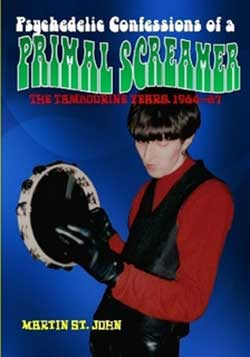 I interviewed John "Joogs" Martin for a piece on his upcoming book last year. Following its appearance on Louder Than War, the website was contacted by representatives of Primal Scream's management to respectfully request that it was removed before legal proceedings were initiated.
I interviewed John "Joogs" Martin for a piece on his upcoming book last year. Following its appearance on Louder Than War, the website was contacted by representatives of Primal Scream's management to respectfully request that it was removed before legal proceedings were initiated.
To be fair, the interview was helluva incendiary in parts as I'd basically given Joogs free rein to vent and some of the material (which he'd had pent up for 27-odd years) was vitriolic and, at times, verging on libellous. It was also very, very funny.
At that point, Joogs (his nom de guerre was flipped by himself to Martin St. John during the PS early days) was looking for publishing for the book that he'd laboured over in his night shift job for several years. He'd actually hand-written it and part of the problem was finding someone to transcribe it all before it was touted around.
- Details
- By Edwin Garland
- Hits: 9377

Hoodoo Guru Dave Faulkner adds his autograph to a copy of "Product 45" at the Sydney Spencer P Jones Benefit. Emmy Etie photo
It was a few weeks ago that a parcel was waiting for me on my veranda. This is not unusual as I often order my vinyl from overseas. I even get the odd review copy of a record. This package was much larger and there was much more weighty. It was the stunningly beautiful book “Product 45 Australian Punk/Post-Punk Single Record Covers”.
I sat down and carefully unwrapped the packaging, opening the first few pages, and my first impression was the high-weighted GSM quality silky paper. This was not the standard book that you would pick up at Dymocks. It had the sense of a limited edition, extremely high-standard production by people who had taken so much care and pride with their talent invested in the design.
- Road Series by Hugo Race (Transit Lounge)
- Neon Angel. A Memoir of a Runaway by Cherie Currie with Tony O’Neill (Harper Collins/Itbooks)
- MDC. Memoir From a Damaged Civilization. Stories of Punk, Fear and Redemption by Dave Dictor (Ma nicD Press)
- Circumstantial Evidence by Frank Secich (High Voltage Publishing)
- Good Night and Good Riddance. How Thirty-Five Years of John Peel Helped Shape Modern Life by David Cavanagh (Faber)
- The Prettiest Star. Whatever Happened to Brett Smiley? By Nina Antonia (SAF)
